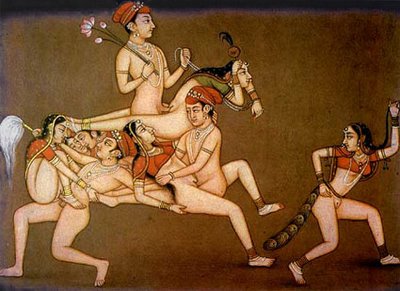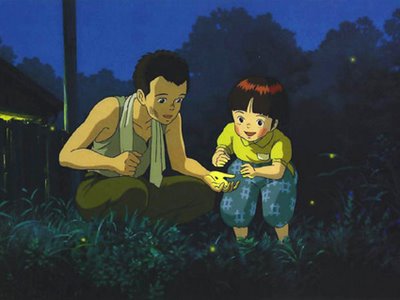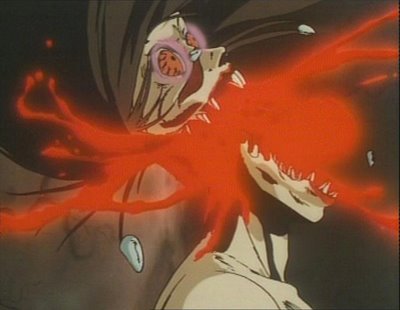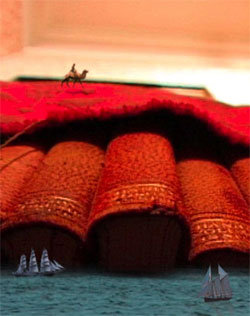
Indian - Horse Pursuing a Peacock
"The orgy was not the farthest point reached by eroticism in the pagan world. The orgy is the sacred aspect of eroticism in which the continuity of beings beyond solitude is most plainly expressed. Only in one way, however. In the orgy continuity cannot be laid hold of; individuals lose themselves at the climax, but in mingled confusion. The orgy is necessarily disappointing. Theoretically it is the complete negation of individual quality. It presupposes, it even demands equality among the participants. Not only is individuality itself submerged in the tumult of he orgy, but each participant denies the individuality of the others. All limits are completely done away with, or so it seems, but it is impossible for nothing to remain of the differences between individuals and their sexual attraction connected with those differences.
The final aim of eroticism is fusion, all barriers gone, but its first stirrings are characterised by the presence of a desirable object.
In the orgy this object does not stand out by itself, for sexual excitement occurs through an uncontrolled urge, the opposite of habitual reserve. But everybody has this urge. It is objective but it is not perceived as an object; the person who perceives it is at the same time animated by it. On the other hand, excitement is normally roused by something distinct and objective. In the animal kingdom, the odour of the female often sets the male after her. The songs and displays of birds bring into play other kinds of perception that tell the female that the male is near and sexual shock is at hand. Smell, hearing, sight and even taste are objective signals distinct from the activity they incite. They are signals to announce the crisis. In the world of man these messages have an intense erotic value. A pretty girl stripped naked is sometimes an erotic symbol. The object of desire is different from eroticism itself; it is not eroticism in its completeness, but eroticism working through it."
The final aim of eroticism is fusion, all barriers gone, but its first stirrings are characterised by the presence of a desirable object.
In the orgy this object does not stand out by itself, for sexual excitement occurs through an uncontrolled urge, the opposite of habitual reserve. But everybody has this urge. It is objective but it is not perceived as an object; the person who perceives it is at the same time animated by it. On the other hand, excitement is normally roused by something distinct and objective. In the animal kingdom, the odour of the female often sets the male after her. The songs and displays of birds bring into play other kinds of perception that tell the female that the male is near and sexual shock is at hand. Smell, hearing, sight and even taste are objective signals distinct from the activity they incite. They are signals to announce the crisis. In the world of man these messages have an intense erotic value. A pretty girl stripped naked is sometimes an erotic symbol. The object of desire is different from eroticism itself; it is not eroticism in its completeness, but eroticism working through it."
From Eroticism: Death and Sensuality by Georges Bataille
The Week in Review
Viewing:

Deadwood: First Season
Ep. 1: 'Pilot - Deadwood' (w. Ted Mann, d. Mark Tinker)
Ep. 2: 'Deep Water' (w. Malcolm MacRury. d. Davis Guggenheim)
Ep. 3: 'Reconnoitering the Rim' (w. Jody Worth, d. Davis Guggenheim)
Ep. 4: 'Here Was a Man' (w. Elizabeth Sarnoff, d. Alan Taylor)
Ep. 5: 'The Trial of Jack MacCall' (w. John Belluso, d. Ed Bianchi)
Ep. 6: 'Plague' (w. Malcolm MacRury. d. Davis Guggenheim)
Ep. 7: 'Bullock Returns to the Camp' (w. Jody Worth, d. Michael Engler)
Ep. 8: 'Suffer the Little Children' (w. Elizabeth Sarnoff, d. Dan Minahan)
Ep. 9: 'No Other Sons or Daughters' (w. George Putnam, d. Ed Bianchi)
Ep. 10: 'Mr. Wu' (w. Bryan McDonald, d. Dan Minahan)
Ep. 11: 'Jewel's Boot Is Made For Walking' w. Ricky Jay. d. Steve Shill)
Ep. 12: 'Sold Under Sin' (w. Ted Mann, d. Davis Guggenheim)

Grave of the Fireflies - w. & d. Isao Takahata (1988)

Porco Rosso - w. & d. Hayao Miyazaki (1992)

Princess Mononoke - w. & d. Hayao Miyazaki (1997)

Steamboy - w. Sadayuki Murai & Katsuhiro Omoto, d. Katsuhiro Omoto (2004)

Tokyo Godfathers - w. Keiko Nobumoto & Satoshi Kon, d. Satoshi Kon (2003)

Urotsukidoji: Legend of the Overfiend & Legend of the Demon Womb - w. Noboru Aikawa, d. Hideki Takayama (1989 & 1991)

Wicked City - w. Kisei Choo, d. Yoshiaki Kawajiri (1987)
Reading:
Deleuze: An Introduction - Todd May
Tezuka: The Marvel of Manga (catalogue essays) - ed. Philip Brophy
Gillian Wearing: Proof (catalogue essay) - Juliana Engberg
Listening:
The Complete String Quartets - Joseph Haydn
The Complete Symphonies - Joseph Haydn
Exhibitions:
Deleuze: An Introduction - Todd May
Tezuka: The Marvel of Manga (catalogue essays) - ed. Philip Brophy
Gillian Wearing: Proof (catalogue essay) - Juliana Engberg
Listening:
The Complete String Quartets - Joseph Haydn
The Complete Symphonies - Joseph Haydn
Exhibitions:

Tezuka: The Marvel of Manga - NGV (International)


Howard Arkley - NGV (Australia)

Light Sensitive: Contemporary Australian Photography from the Loti Smorgon Fund - NGV (Australia)

Living Proof: Gillian Wearing - ACCA